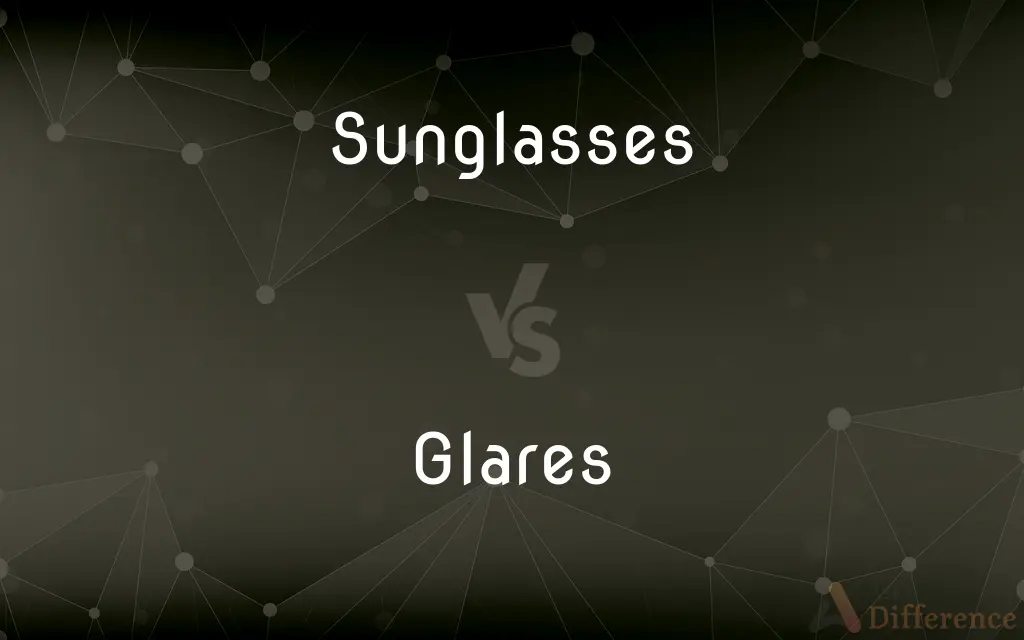Sunglasses vs. Glares — What's the Difference?
By Tayyaba Rehman — Published on November 25, 2023
Sunglasses are protective eyewear that shield the eyes from sunlight; Glares refer to intense and blinding reflected light.

Difference Between Sunglasses and Glares
Table of Contents
ADVERTISEMENT
Key Differences
Sunglasses are specifically designed eyewear that serves to protect the eyes from harmful UV rays and excessive light. Their tinted or polarized lenses minimize the impact of sunlight, offering comfort to the wearer. On the other hand, Glares are not a type of eyewear but rather a description of an intense and often blinding light, typically reflecting off surfaces.
Wearing Sunglasses can significantly reduce the effects of glares, especially when driving or during water-based activities. This is because the reflective properties of water or a shiny car hood can cause Glares, which can be both distracting and harmful to the eyes. Sunglasses, with their specially designed lenses, can mitigate this issue by filtering out the excessive brightness.
While Sunglasses come in various styles, shapes, and colors, all catering to different preferences and needs, Glares remain an environmental challenge that people often want to avoid. Sunglasses not only offer a fashion statement but are a practical necessity in environments with strong Glares, like snowy terrains or beaches.
Another interesting aspect of Sunglasses is their cultural and iconic status in fashion and films. Stars often wear them, contributing to their cool persona. Conversely, Glares are frequently used in literature and films to depict challenging or blinding situations, emphasizing the need for protection like Sunglasses.
Comparison Chart
Definition
Protective eyewear to shield from sunlight
Intense and blinding reflected light
ADVERTISEMENT
Primary Function
Protect eyes from UV rays and excessive light
Represents a challenge or hindrance
Usage
Wearable item
Environmental phenomenon
Association
Fashion, protection, style
Difficulty, distraction, blinding situations
Physical Presence
Tangible item
Abstract concept related to light
Compare with Definitions
Sunglasses
Tools for reducing eye strain.
I wear Sunglasses to prevent squinting.
Glares
Intense and blinding light.
The Glares off the snow hurt his eyes.
Sunglasses
Fashion accessory enhancing style.
Her Sunglasses perfectly matched her outfit.
Glares
A challenging or hindering brightness.
Driving west during sunset, he faced the Glares head-on.
Sunglasses
Tinted lenses for UV protection.
These Sunglasses block 99% of UV rays.
Glares
Reflective brightness from a surface.
The Glares from the water made it hard to see.
Sunglasses
Shields against environmental glares.
Sunglasses are essential for driving in sunny conditions.
Glares
To stare fixedly and angrily.
Sunglasses
Eyewear protecting against sunlight.
She wore her Sunglasses to the beach.
Glares
To shine intensely and blindingly
A hot sun glared down on the desert.
Sunglasses
A convex lens used to focus the sun's rays and produce heat, especially for ignition.
Glares
To be conspicuous; stand out obtrusively
The headline glared from the page.
Sunglasses
Sunglasses Eyeglasses with tinted or polarizing lenses to protect the eyes from the sun's glare.
Glares
To express by staring angrily
He glared his disapproval.
Sunglasses
Tinted glasses worn to protect the eyes from the sun.
Glares
A fierce or angry stare.
Sunglasses
(colloquial) A person wearing sunglasses
Glares
An intense, blinding light
Under the glare of the spotlights.
Sunglasses
Spectacles that are darkened or polarized to protect the eyes from the glare of the sun;
He was wearing a pair of mirrored shades
Glares
Overwhelming attention or intrusiveness
The glare of publicity.
Glares
A sheet or surface of glassy and very slippery ice.
Glares
Plural of glare
Glares
Overpowering luminescence causing discomfort.
Without curtains, morning Glares woke her up.
Common Curiosities
Are all Sunglasses capable of blocking UV rays?
Most quality Sunglasses offer UV protection, but it's essential to check the specifications.
How are Glares different from brightness?
While brightness refers to the amount of light, Glares are intense, often blinding reflected light.
Can Sunglasses help reduce the effects of Glares?
Yes, Sunglasses can significantly reduce the effects of glares.
What are the primary purposes of Sunglasses?
Sunglasses protect the eyes from harmful UV rays and excessive light.
Are polarized Sunglasses better for reducing Glares?
Yes, polarized Sunglasses are designed specifically to reduce Glares.
How do I recognize Glares while driving?
Glares while driving can manifest as blinding reflected light, making it hard to see.
Can I get prescription Sunglasses?
Yes, many opticians offer prescription Sunglasses.
Do Sunglasses lose their UV protection over time?
With wear and tear, the UV coating on some Sunglasses can deteriorate.
What do we mean by Glares in terms of light?
Glares refer to intense and often blinding reflected light.
Can Glares be harmful to the eyes?
Prolonged exposure to strong Glares can strain or damage the eyes.
Are there Sunglasses designed specifically for sports?
Yes, there are sports-specific Sunglasses designed to reduce Glares and offer better protection during activities.
Are Glares only caused by the sun?
While the sun is a common source, Glares can also come from artificial lights or reflections.
Why do pilots wear Sunglasses?
Pilots wear Sunglasses to reduce eye strain from Glares and protect their eyes from UV rays.
Is there a way to reduce Glares at night while driving?
Anti-glare driving glasses or ensuring your windshield is clean can help reduce night-time Glares.
Do Glares affect animals?
Many animals are affected by Glares, especially aquatic animals with water reflections.
Share Your Discovery

Previous Comparison
Professional vs. Amateur
Next Comparison
Ricotta Cheese vs. Cottage CheeseAuthor Spotlight
Written by
Tayyaba RehmanTayyaba Rehman is a distinguished writer, currently serving as a primary contributor to askdifference.com. As a researcher in semantics and etymology, Tayyaba's passion for the complexity of languages and their distinctions has found a perfect home on the platform. Tayyaba delves into the intricacies of language, distinguishing between commonly confused words and phrases, thereby providing clarity for readers worldwide.
















































